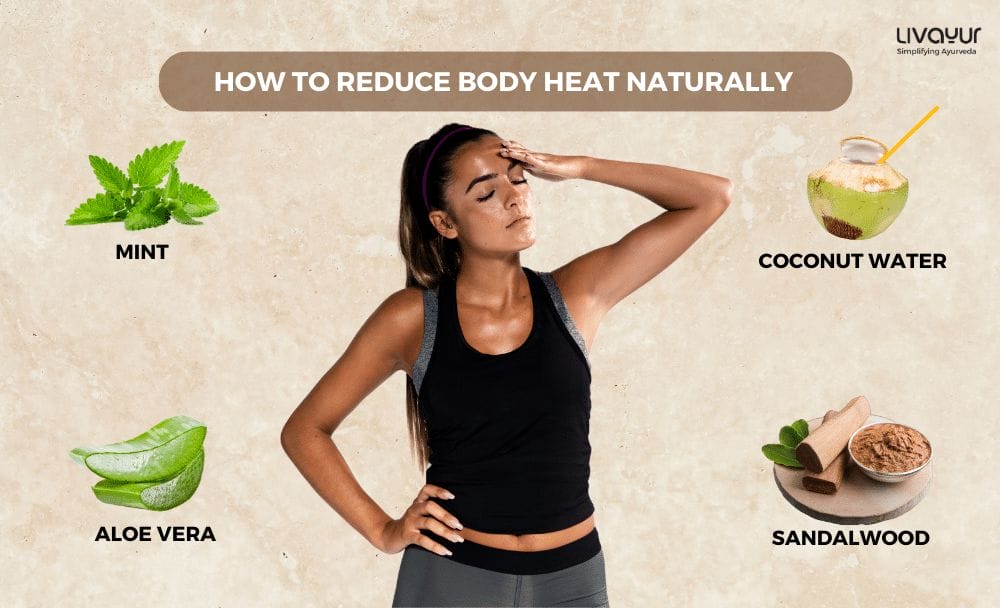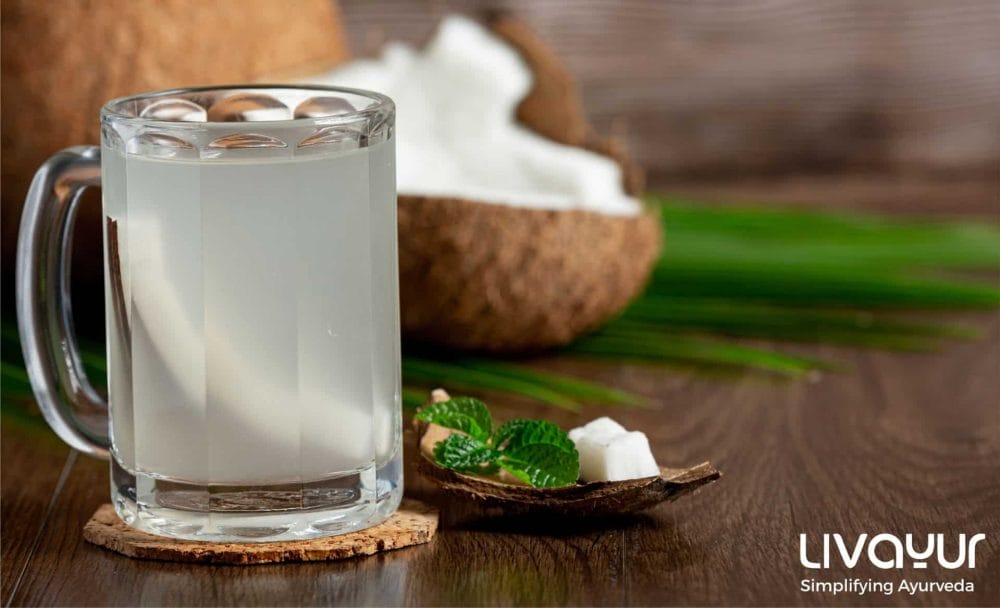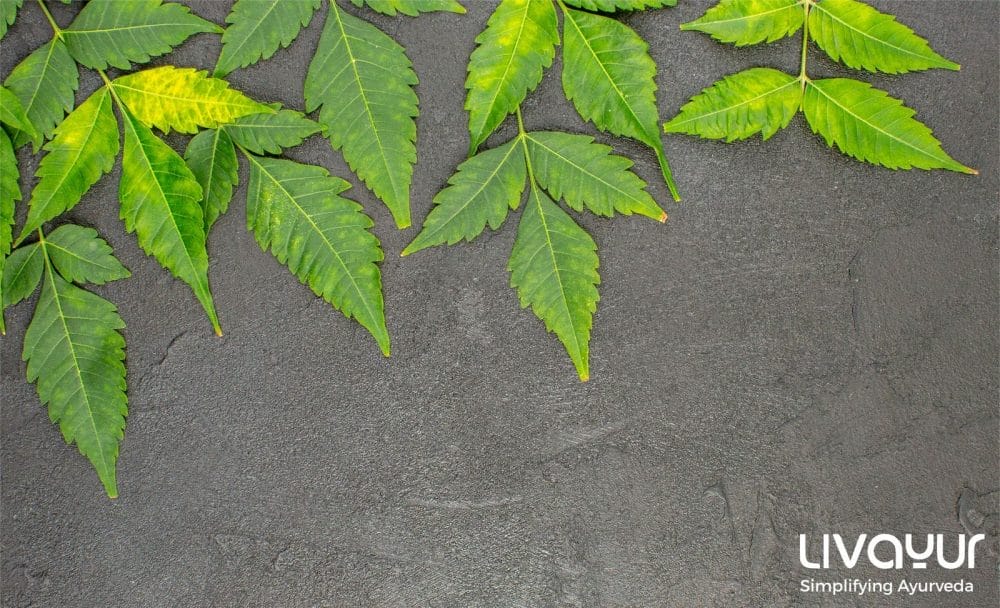
In Ayurveda’s holistic approach to health and well-being, the equilibrium of one’s internal body temperature plays a crucial role in maintaining vitality. The ancient wisdom of Ayurveda recognizes the significance of striking a harmonious balance between the body’s cooling and heating mechanisms to promote optimal health.
Excessive body heat, often called “pitta” imbalance, can lead to various discomforts, including digestive disturbances and emotional turbulence. Fortunately, Ayurveda offers natural remedies derived from Mother Nature to help alleviate excess body heat and restore inner balance. This article explores the 15 best Ayurvedic treatments that will help you naturally reduce body heat.
What leads to increased body heat?
From the perspective of Ayurveda, an increase in body heat primarily stems from an imbalance in the “pitta” dosha. It is one of the three fundamental energies governing the human body. Several factors can contribute to the aggravation of pitta dosha and subsequently lead to heightened body heat.
Dietary choices play a pivotal role. Consuming excessive quantities of spicy, fried, or sour foods can stimulate pitta dosha, causing an increase in body heat. Additionally, emotional stress and negative emotions, like anger and frustration, can disturb the delicate equilibrium of the doshas and contribute to elevated body heat.
Environmental factors, like heat exposure or the sun, can also play a significant role. Furthermore, inadequate rest and sleep can exacerbate the imbalance. Recognizing and addressing these factors is essential in the Ayurvedic approach to managing and reducing excess body heat. [1] [2]
15 remedies on how to reduce body heat
Here are 15 remedies that can help reduce body heat and restore balance.
- Coconut water
The cooling properties of coconut water can help soothe excess body heat and replenish lost fluids. [3]

- Aloe vera
Aloe vera gel, when consumed or applied topically, can have a cooling effect on the body and aid in reducing heat-related discomfort. [4]
- Mint
Mint leaves or peppermint tea are known for their natural cooling properties and can help mitigate excess body heat. [5]

- Cucumber
Cucumbers have a high water content and are cooling in nature. Including them in your diet can help regulate body temperature. [6]
- Coriander
Coriander leaves can be used in cooking or steeped into tea to counteract excess body heat. [7]
- Sandalwood
When applied to the skin, sandalwood paste provides a soothing and cooling effect, especially when mixed with rosewater. [8]
- Fennel seeds
Fennel seeds, either chewed or infused in hot water, can aid in digestion and help cool the body. [9]
- Buttermilk
A glass of buttermilk with a pinch of cumin and salt can be an excellent choice to promote digestion and reduce body heat, especially during summer. [10]
- Ghee
Moderate consumption of ghee (clarified butter) can help balance pitta dosha and alleviate heat-related issues. [11]
- Watermelon
This hydrating fruit is delicious and highly effective in reducing body heat.
- Saffron
When taken with milk, Saffron can have a cooling effect on the body and calm the mind. [12]
- Neem
Neem leaves or neem oil are ideal for their purifying and cooling properties, both internally and externally. [13]
- Turmeric
In small quantities, turmeric can aid digestion and balance body heat. [14]
- Amla (Indian gooseberry)
Amla is rich in antioxidants and vitamin C. These properties can help combat inflammation and excess heat in the body. [15]
- Yoga and pranayama
Incorporating cooling yoga poses and pranayama (breathing exercises), such as Sheetali and Sheetkari, can help regulate body temperature and reduce stress, which can exacerbate Pitta imbalances. [16]
When to consult a doctor
Here are some instances where it is advisable to consult a medical professional.
- Persistent or severe symptoms
If you experience persistent or severe symptoms of excessive body heat, like high fever or extreme dehydration, it is crucial to seek immediate medical attention.
- Underlying medical conditions
Individuals with existing medical conditions must contact a healthcare provider for a comprehensive assessment and tailored treatment plan.
- Medication interactions
If you are taking medications, it’s important to consult a doctor before starting any Ayurvedic remedies, as certain herbs and remedies may interact with medicines.
- Pregnancy and lactation
Pregnant or breastfeeding individuals should exercise caution when considering Ayurvedic remedies and consult a healthcare provider to ensure the safety of any chosen treatments.
- Chronic conditions
Chronic conditions that cause recurrent episodes of excess body heat or inflammation may require a more in-depth evaluation and treatment plan, which a healthcare provider can offer.
- Allergic reactions
In the event of an allergic reaction to any Ayurvedic remedy or ingredient, seek immediate medical attention.
- Long-term management
Consulting an Ayurvedic practitioner can provide personalized guidance and treatment plans for those seeking long-term management of imbalances or chronic conditions.
FAQs
1. How to reduce body heat immediately?
You can reduce body heat immediately by consuming coconut water, applying aloe vera gel to the skin, sipping on mint-infused water, using cucumber slices, making coriander seed tea, or chewing fennel seeds for quick relief.
2. How to reduce body heat naturally?
To naturally reduce body heat, include cooling foods like cucumber and watermelon. Additionally, have herbs like mint and coriander, practice yoga and pranayama, and stay hydrated with coconut water and buttermilk while applying aloe vera or sandalwood paste for natural cooling.
3. How to reduce body heat immediately at home?
You can quickly reduce body heat at home by consuming coconut water, applying aloe vera gel, sipping mint tea, using cucumber slices, making coriander seed tea, or chewing fennel seeds for immediate relief.
4. How to reduce internal body heat?
Reducing internal body heat involves maintaining a balanced diet with cooling foods like cucumbers and watermelons, staying hydrated, practising yoga and pranayama for overall cooling, and avoiding excessive consumption of spicy and heat-inducing foods.
5. How to reduce body heat ayurveda?
According to Ayurveda, you should follow a pitta-pacifying diet that includes foods like coconut water, coriander, and ghee to reduce body heat. Ayurvedic remedies like sandalwood paste and aloe vera can also be applied or consumed, and yoga and pranayama practices can help balance body heat.
6. How to reduce body heat pimples?
To reduce body heat and prevent pimples, maintain good hygiene, wash your face with a mild cleanser, avoid spicy and oily foods, consume cooling foods like cucumbers, apply aloe vera gel or sandalwood paste to affected areas, and drink plenty of water to keep your skin hydrated.
7. How to reduce body heat home remedies?
Home remedies to reduce body heat include consuming coconut water, aloe vera, mint-infused water, or coriander seed tea, using sandalwood paste, chewing fennel seeds, eating watermelon and amla, practicing yoga and pranayama, and staying hydrated with buttermilk. These natural remedies can help cool the body effectively at home.
Conclusion
Pursuing balance in body temperature, as Ayurveda advocates, empowers individuals with a holistic approach to well-being. Incorporating the aforementioned Ayurvedic remedies can help alleviate excess body heat naturally and promote a state of equilibrium. The benefits of hydrating with coconut water and buttermilk, using cooling ingredients like aloe vera, mint, cucumber, and coriander, and the importance of practicing yoga and pranayama for long-term heat regulation are crucial.
Additionally, the wisdom of Ayurveda reminds us that personalized approaches are often the most effective. Consulting with a qualified Ayurvedic practitioner can provide tailored guidance for individual constitutions. Embracing and integrating these insights into your daily life will help nurture a harmonious balance for optimal health.
Disclaimer
The information provided here does not intend to replace professional advice or treatment.
References
- A glimpse of Ayurveda – The forgotten history and principles of Indian traditional medicine. January 2017
- AMLAPITTA (GASTRITIS/ ACID PEPTIC DISEASE/ HYPERACIDITY)
- Therapeutic and Nutritional Values of Narikelodaka (Tender Coconut Water) -A Review. December 2014
- Therapeutic and Medicinal Uses of Aloe vera: A Review. January 2013
- Mentha: Nutritional and Health Attributes to Treat Various Ailments Including Cardiovascular Diseases.
- Phytochemical and therapeutic potential of cucumber.
- CORIANDER (CORIANDRUM SATIVUM): A COMMON INDIAN TRADITIONAL SPICE AND AYURVEDIC REMEDY.
- MEDICINAL PROPERTIES OF SANDALWOOD
- Fennel and fennel seed.
- CRITICAL EVALUATION OF TAKRA (BUTTERMILK) IN AYURVEDA.
- Ghee : Its Properties, Importance and Health Benefits.
- Saffron: A repository of medicinal properties.
- Neem the Wonder Herb: A Short Review
- Turmeric: A Herbal and Traditional Medicine
- Emblica officinalis Gaertn. (Amla): A Wonder Gift of Nature to Humans
- IMPACT OF SHEETALI PRANAYAMA ON AUTONOMIC FUNCTION AND CARDIOVASCULAR PARAMETERS IN HEALTHY VOLUNTEERS



















